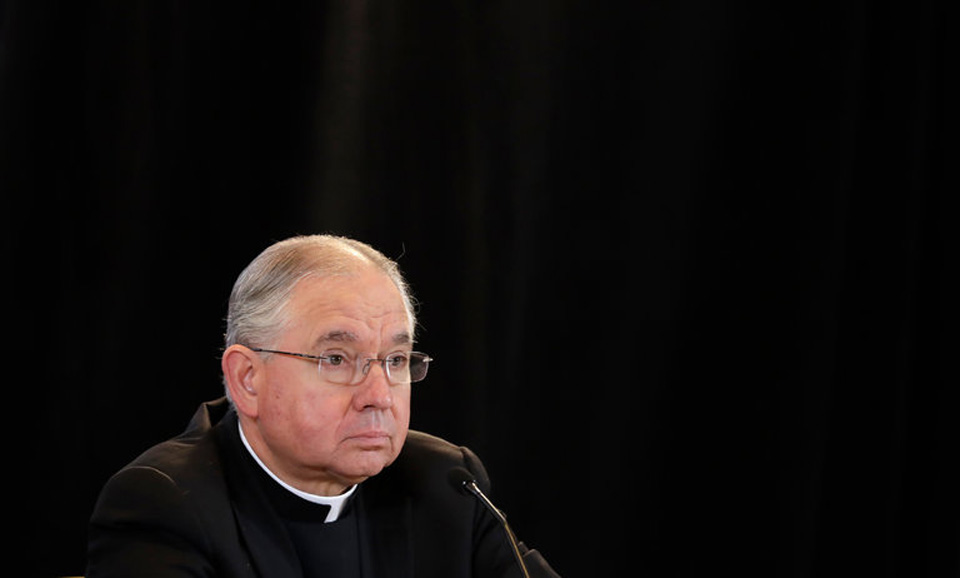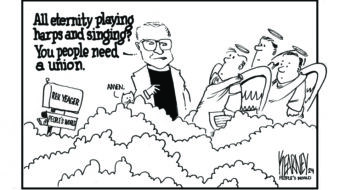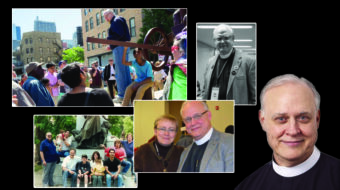
The U.S. Conference of Catholic Bishops has elected its first Latino as their vice president, Los Angeles Archbishop José H. Gómez. The election took place on Tues., Nov. 15, in Baltimore. The new officers’ term begins at the end of January, shortly after Donald Trump assumes office.
The L.A. archbishop is a Mexican native, born in Monterrey, and since 1995 a U.S. citizen.
Normally the vice president is expected to succeed the president of the U.S. Conference after a three-year term, as the current vice president, and now newly elected president, Cardinal Daniel N. DiNardo, will do.
Gómez claimed to be surprised by his election, which took place exactly one week after Donald Trump won the presidency of the United States. Was the vote a rebuke to the incoming president, or more generally a nod, as he put it, to the “importance of Los Angeles in our country and the importance of Latinos on our country.”
The Los Angeles archdiocese counts over 3 million Latinos. More than a third of all Catholics in the U.S. are Latinos.
On Nov. 10, only two days after the disastrous Trump election, Gómez spoke to an interfaith gathering of worried congregants at his downtown L.A. Cathedral. “We are here tonight,” he told the crowd, “because our people are hurting, and they feel afraid.”
Addressing the gathering, he promised to “our brothers and sisters who are undocumented, we will never leave you alone. En las buenas y en las malas. In good times and in bad, we are with you. You are family.”
A week later, at the U.S. Conference meeting, the bishops issued a letter of congratulations to President-elect Trump that also warned him of the Church’s strong commitment to families, refugees and social justice.
The Catholic Church in the U.S. has been intensely focused on the immigration issue, and is disturbed by the high number of deportations under President Obama — more than two and a half million between 2009 and 2015. Keeping families together has been a frequently sounded theme for the Church in these years. The Church has vowed to do everything it can to protect undocumented residents of the U.S.
If a President Trump were to fulfill his vow to deport all 11 million-plus undocumented immigrants within his first two years, that would in effect spell the seizure of 15,000 people every single day. No wonder, Gómez says, “There are men and women who can’t sleep because they are trying to figure out what to do” in the event of the federal government’s fateful knock on the family’s front door.
Archbishop Gómez has become an expert witness on the subject of immigration. He spoke on behalf of the U.S. Conference of Catholic Bishops before the House Judiciary Subcommittee on Immigration Policy and Enforcement, testifying to the bishops’ commitment to immigration policy reform. He has also addressed the Senate Judiciary Committee.
In 2013 his book Immigration and the Next America: Renewing the Soul of Our Nation appeared. Gómez advocates accountability for illegal entry into the U.S. through fines or community service; deportation, he believes, is too severe a punishment for poor people trying to better their lives in America. In the words of the author:
“Immigration is a human rights test of our generation. It’s also a defining historical moment for America. The meaning of this hour is that we need to renew our country in the image of her founding promises of universal rights rooted in God. Immigration is about more than immigration. It’s about renewing the soul of America.”
The Nov. 15 vote by the Conference of Bishops was not automatic or unanimous. While Di Nardo was elected president as anticipated, a close contest ensued for vice president between Archbishop Gregory Aymond of New Orleans and Gómez. Only after two ballots among an initial field of nine candidates and a final run-off did Gómez eventually win. Aymond is a moderate-progressive regarded as aligned with Pope Francis’ social justice views, while Gómez, a member of the conservative Catholic organization Opus Dei, is more traditional.
In voting for Gómez, members of the Conference may have wanted to reinforce conservative views on Catholic doctrine and oppose the steady encroachment of secularism in American life. But they may also have chosen Gómez out of solidarity, since he had been passed over among the pontiff’s recent American cardinal appointments, and the symbolism of a Latino immigrant in the country’s largest diocese cannot be ignored.
As the broad coalition comes together to oppose the Trump agenda, the Catholic Church has positioned itself as a strong ally on critical issues of dire and immediate importance.












Comments